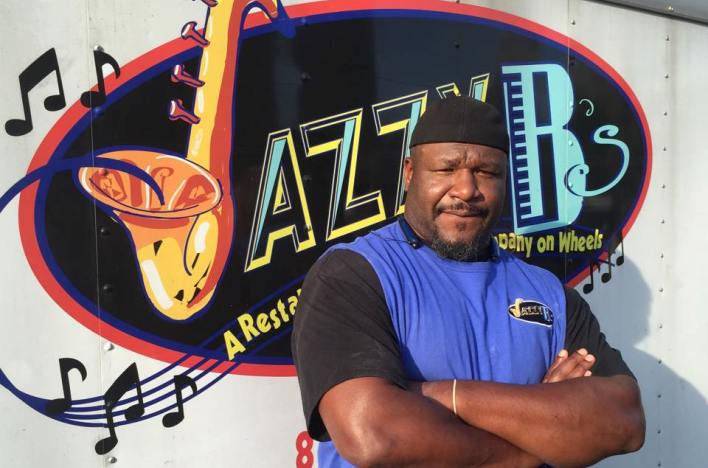Local foodies know Brandon Simpson for the brisket tacos and smoke-fried chicken wings he serves through Jazzy B’s, his food truck and catering business.
Starting in April, though, he’ll be dishing out something else: practical advice on starting and running a food truck business.
Simpson and the Mid-Continent Public Library’s Square One Small Business Services will team up to present a free six-week class on the food truck business. Simpson took time to talk about the course and his own experiences as a mobile food entrepreneur.
What Will the Class Cover?
 The course will start with an April 23 panel discussion at Mid-Continent’s Raytown branch. The panel will feature several local food truck owners, who will share their stories, Simpson said.
The course will start with an April 23 panel discussion at Mid-Continent’s Raytown branch. The panel will feature several local food truck owners, who will share their stories, Simpson said.
In future classes, Simpson will walk attendees through a range of practical concerns: permits, equipment, finding spots where a truck can set up, marketing and more.
“We’re going to tackle all of those within those six weeks,” Simpson said. “We’ll leave no stone unturned.”
The course should be useful for people who are still thinking about starting a food truck and those who already have their own trucks but are still less than a year into the business, Simpson said.
Interested in taking part? You can sign up here.
Where Did the Idea for a Food Truck Class Come From?
Simpson is active with a local industry group, the Kansas City Food Trucks Association. Over the last several years, the group has received calls from several people interested in starting their own food trucks. Simpson decided there might be enough interest out there for a formal workshop on the business.
At the same time, the Mid-Continent Public Library was looking to rev up its small business offerings. Library leaders had visited another city that offered a food-truck course and thought it might be a good idea for Kansas City.
How Big Are Food Trucks in Kansas City?
Simpson started Jazzy B’s about four and a half years ago. At the time, there were maybe a couple hundred food trucks in Kansas City, Mo. Today, the number of trucks is closer to 400 or 500, he said.
While there are more food trucks out there, awareness and accommodations are still a problem.
For example, if you go to places like Dallas-Fort Worth, Seattle or Austin, food trucks are naturally incorporated into major community events. Local food trucks have a tougher time finding spots near Sprint Arena and the Power & Light District.
“Here in Kansas City, they don’t know what to do with us quite yet,” Simpson said.
What’s the Biggest Misconception Newbies Have About the Food Truck Business?
“The hours,” Simpson said. “It’s huge.”
Some beginners get into the business believing that it’s something they can do in a few hours on the weekends. To be successful, though, food truck operators have to spend a great deal of time on preparation and marketing.
(Marketing is the Achilles’ heel for a lot of food trucks, Simpson said. The operators don’t devote nearly enough time to branding and social media, which are crucial to building a client base. When your business moves around every day, you have to work hard to make sure customers can find you.)
“They think they’re going to get in and make a whole lot of money right off the bat. … This is not the business for that. This is a grind.”
What Does Simpson Like About Food Trucks?
When he started Jazzy B’s, he said, “I was using it as a catapult to open a restaurant, to see if people would like my style of food.”
While he hasn’t ruled out a brick-and-mortar location, Simpson has found a lot to love about the food truck experience. For one, the overhead is lower. And he enjoys the one-on-one interactions he has with customers.
“They can see right then and there what’s being cooked,” he said, “and I can see their reaction.”
Plus, being mobile lets him introduce Jazzy B’s food to a greater number of people.
“I’m a person who likes to move around,” Simpson said. “I want to spread my food around Kansas City.”


